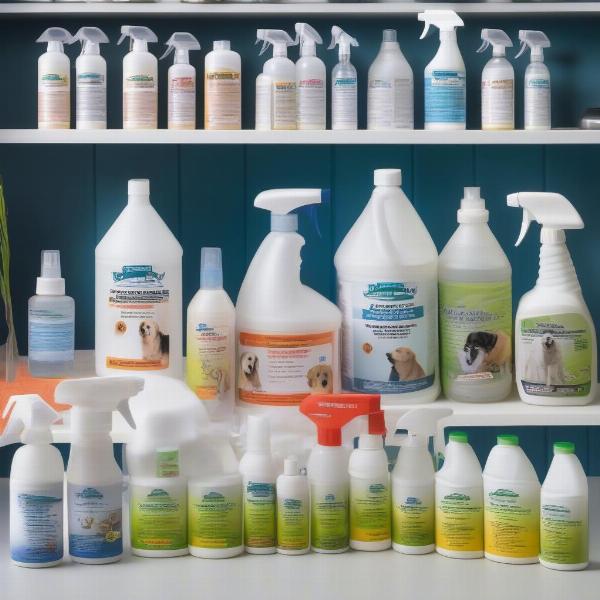Maintaining a clean dog kennel is crucial for your furry friend’s health and happiness. A dirty kennel can harbor harmful bacteria and parasites, leading to illness and discomfort. This guide dives deep into the world of dog kennel cleaners, providing you with everything you need to know to choose the right product and keep your dog’s living space spotless.
Choosing the Right Dog Kennel Cleaner
Selecting a suitable dog kennel cleaner involves considering various factors, from your dog’s sensitivity to the material of your kennel. Opt for non-toxic, pet-safe cleaners to avoid harming your dog. Avoid products containing harsh chemicals like bleach or ammonia, which can irritate their respiratory system and skin. Consider enzymatic cleaners for breaking down organic matter like urine and feces, effectively eliminating odors. For kennels made of plastic or metal, most cleaners are suitable. However, wooden kennels may require specific cleaners to avoid damage. Always test a small, inconspicuous area first.
Different Types of Dog Kennel Cleaners
Several types of dog kennel cleaners cater to different needs and preferences. Disinfectant sprays are a popular choice for quick and easy cleaning, effectively killing bacteria and viruses. Concentrated cleaners offer a more economical option, requiring dilution before use. Enzymatic cleaners are particularly effective at eliminating stubborn stains and odors caused by organic matter. Natural cleaners, made with ingredients like vinegar and baking soda, are a safe and eco-friendly alternative.
 Different Types of Dog Kennel Cleaners
Different Types of Dog Kennel Cleaners
Step-by-Step Kennel Cleaning Guide
Follow these steps to ensure a thorough and effective kennel cleaning:
- Remove all bedding and toys: This allows for easy access to all surfaces.
- Sweep or vacuum: Remove loose dirt, hair, and debris.
- Apply cleaner: Follow the manufacturer’s instructions for proper dilution and application.
- Scrub thoroughly: Pay attention to corners and crevices where dirt and bacteria can accumulate.
- Rinse thoroughly: Ensure all traces of cleaner are removed.
- Dry completely: A dry kennel prevents the growth of mold and mildew.
- Replace bedding and toys: Once the kennel is completely dry, add fresh bedding and toys.
How Often Should You Clean Your Dog’s Kennel?
The frequency of cleaning depends on factors like the size of the kennel, the breed of your dog, and their habits. A general rule of thumb is to spot clean daily, removing any feces or urine immediately. A more thorough cleaning, including scrubbing and disinfecting, should be done at least once a week. dog kennel for garden require more frequent cleaning, especially during rainy seasons.
Maintaining a Clean Kennel: Tips and Tricks
Maintaining a clean kennel doesn’t have to be a chore. Establish a regular cleaning routine to make the process easier. Invest in quality cleaning tools, like a sturdy brush and a spray bottle. Keep a dedicated set of cleaning supplies just for the kennel to prevent cross-contamination. For persistent odors, consider using a dog wee neutraliser. Providing ample space and considering an x large collapsible dog crate can contribute to a cleaner environment. Utilizing dog mats for training can also help maintain cleanliness in designated areas.
Conclusion
Choosing the right dog kennel cleaner and establishing a regular cleaning routine are essential for your dog’s well-being. A clean kennel promotes a healthy and happy environment for your furry companion. Remember to always prioritize pet-safe products and consult with your veterinarian if you have any concerns.
FAQ
- What is the best dog kennel cleaner for removing odors? Enzymatic cleaners are highly effective at neutralizing odors caused by urine and feces.
- Can I use bleach to clean my dog’s kennel? No, bleach is toxic to dogs and should never be used to clean their kennel.
- How often should I replace my dog’s bedding? It’s recommended to wash your dog’s bedding at least once a week.
- What can I do to prevent my dog’s kennel from smelling? Regular cleaning, proper ventilation, and using enzymatic cleaners can help prevent odors.
- Are natural dog kennel cleaners as effective as chemical cleaners? While natural cleaners are a safer alternative, they may not be as effective at killing certain bacteria and viruses.
- Can I use dish soap to clean my dog’s kennel? Mild dish soap can be used, but ensure it’s thoroughly rinsed to avoid residue.
- What should I do if my dog is allergic to certain cleaners? Consult with your veterinarian to find a hypoallergenic cleaner that’s safe for your dog.
About ILM Dog
ILM Dog (ilmdog.com) is your trusted international resource for comprehensive dog care and breeding information. We offer expert advice on everything from breed selection and health care to training, nutrition, and product recommendations. We’re dedicated to helping dog owners worldwide provide the best possible care for their furry companions. For expert advice and personalized guidance, contact us at [email protected] or call us at +44 20-3965-8624.